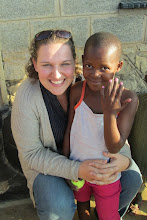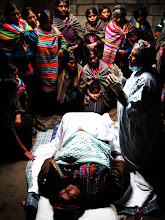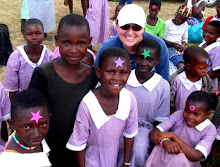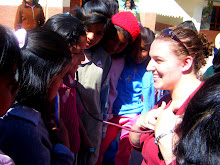While my parent's did heavily reward and emphasise doing well in school, I can't let them take all the blame. I was just as much the culprit of my own self-obsession with perfection. Getting a 98% on a Calculus exam, or having a 3.989 GPA, was just never quite good enough for me. I have always loved school- and clearly still do- but I'd be lying if I said that my success in academia has been the result of sheer talent or passion for the subject matter... I am simply a driven, Type A, over-achiever, who craves approval. A large portion of my self-worth is, perhaps wrongly, tied up in how good I am at what I do.
So you can begin to imagine the difficult crisis of conscious I faced when I my own success as a teacher was suddenly intimately tied to the academic success of 150+ Basotho teenagers in rural Lesotho... Their success hinged on mine as a teacher, and I never fail at anything. But I sure did at this...
Last January, I dove into my first year as a teacher with the same characteristic vigour and passion, I apply to everything I do in life... Because, as we have established, I can't do ANYTHING halfway. So I did everything possible to succeed in my new role as an educator: I used interactive teaching techniques, catered to oral learners with rhythmic "call and response" techniques, and created hands-on visuals and experiments (which isn't easy when you work at a school with no resources!) to make my classes fun! I implemented positive reinforcement and did away with corporal punishment. I created clear expectations, and predictable daily rituals. I rewarded questions and encouraged classroom engagement with "kilo claps" and hilarious warm-ups that had me dancing around with my 8th graders pretending to "Eat! Eat! Bananas!" You name it, I tried it.
Then mid-term exams rolled around... And my poor kids failed, and failed, and failed.
It was absolutely devastating for me. With their failure, I felt that I had failed, too. Worst of all, however, I'd failed THEM. They needed and deserved an incredible teacher, and in my eyes, my best simply wasn't good enough. For days, I poured over grade books, marking memos, lesson plans, and past exams... I tried desperately to make sense of where I went wrong. What could I do differently to get them to succeed?
I came up with a few possibilities, but answers to my own question were few and far between. Yet when I returned to school after winter break, I did so with a renewed energy... I was ready to throw myself headlong into the throes again... This time hoping maybe something would miraculously change. And then... Sometime in the midst of my first week back to school, I did notice miraculous changes: Montsi, a shy boy in the back corner of my Form B Maths class started coming to ask for help with homework after class. Sibongile, who has never shown an interest in Science, asked an awesome and insightful "real world" Physics question that I didn't know the answer to. Timid and quiet Mathabi volunteered to solve a triangle problem on the board in Form A Maths. Ntsoaki and her "too cool for school" girlfriends asked me to plan a Young Women's Group meeting on "Peer Pressure and Sex." Thembekile stayed late to tell me about financial problems at home, and Sebolelo confessed she wants to be an Engineer, like me. And that's when it hit me...
When I asked "What could I do differently to get them to succeed?" I should have been asking "What does it mean for them to succeed?"
As a child of middle-class America, success had always been quantifiable and comparable to me. My apparent successes and self-worth had always been summed up in a grade book, with careful columns of numbers and letters... With red pen marks, and brightly colored stickers. I had tried to apply the same measure of success to my students here, but that was utterly unfair and short-sighted... Perhaps akin to using a ruler to measure a liter of water. It simply isn't a good measure of their "progress." Okay, yes... Perhaps they don't understand how to add fractions. But the sheer fact that Mathabi was brave enough to come up, and solve a problem in Maths was a HUGE success in my eyes, and more importantly, in his. It just took knowing my students as individuals for me to see the tiny miraculous changes occuring around me every single day.
My kids have the deck stacked against them...You name it, they face it. Poverty, HIV, language barriers, cultural norms, stereotypes about educated people, hunger, physical distance from school, financial problems, and lack of familial support to attend school. Their mere presence every day, for some, is a massive triumph of the human spirit; evidence that they desire to become better and attain more in their lives. It took me a while to recognize that. To let go of my scale for "what is success" and embrace a new idea of what success might look like for them.
It's possible (and even probable) that most of my students will never go to University or even graduate high school. They may not become lawyers or doctors. My girls may, willingly or unwillingly, become teenage brides and young mothers. One day down the road, however, it's possible that one of them will advocate that their partner use a condom, because I taught them to have self-confidence. Perhaps they'll speak English to their children, or become father's that sacrifice other luxuries to send their kids to school. Maybe they'll remember that science can be fun. Perhaps they'll find themselves asking "why" or "how" when they see a rainbow arch across the sky.
And maybe.... Just maybe, that is the meaning of success.
With Love from Lesotho... -Mary E.






No comments:
Post a Comment